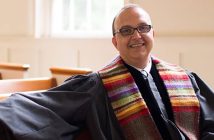 When assisting people who are suffering from the effects of trauma, Mary Beth Werdel, Ph.D., said mental health practitioners should consider the person’s faith as a tool for healing.
When assisting people who are suffering from the effects of trauma, Mary Beth Werdel, Ph.D., said mental health practitioners should consider the person’s faith as a tool for healing.
Werdel, a visiting professor of pastoral counseling in the Graduate School of Religion and Religious Education (GRE), explored the topic in a lecture on March 1 at Fordham Westchester.
“Bessel van der Kolk, who is one of the leading trauma researchers, described a traumatic experience as leaving a person with the feeling that they’ve lost their way in the world. So trauma takes away our map. It takes away the cognitive framework through which we can navigate our world,” she said.
Werdel described the difference between a global meaning and a situational meaning as it applies to trauma victims. An example of a global meaning—one that enables people to make sense of the world—might be that the world is generally a safe place.
But a traumatic event changes that perception, because the victim’s situational meaning—one that helps them make sense of their specific place in the world—is markedly different.
It is in reconciling these two meanings that some people can experience growth and recovery. That kind of growth is associated with people who tend to be creative thinkers, as well as people who generally exhibit several variables, including higher levels of optimism, hopefulness and openness, she said.
One variable that does not factor heavily is positive social support, Werdel said.
“The research has found it’s not so important to have positive social support, even though that’s good,” she said. “What’s really important is that there’s not negative social support—there aren’t people surrounding us who are discounting our traumatic experience. That actually has a profound negative impact on our ability to heal.”
As to the roles that religion and spirituality play in healing, she noted that religious texts such as St. Paul’s Letter to the Romans have long shown the links between suffering and personal growth.
Religious orientation is a factor in healing when it’s intrinsic—someone who is attracted to religion for its beliefs—as opposed to extrinsic, such as someone who goes to church to make new friends.
“Intrinsic religiosity tends to be correlated with growth, and specifically, this sub-scale of readiness to face existential questions,” she said.
Religious coping is another variable that has been studied, and like orientation, Werdel noted it can be split into two parts: Positive religious coping reflects a secure relationship with God, while negative religious coping tends to embrace a tenuous, ominous view of the world. An example of negative religious coping, she said, is someone who blames God for the tragedy that has affected him or her.
Finally, the more religious practices that a person embraces, the more likely he or she will be able to grow. As such, spiritual and religious variables say something unique that other variables don’t capture, Werdel said.
“Theory and research provide evidence for the importance of doing spiritual assessments with our clients, for getting an understanding of what their faith beliefs are, she said. “We don’t need to get into theological conversations, necessarily, but how their lived experience of God relates to what they bring to the mental health sessions.”
Her lecture, “Rising in Wreckage: Theory, Research and Clinical Implications of the Relationship Between Spirituality and Post-Traumatic Growth,” was sponsored by GRE.

